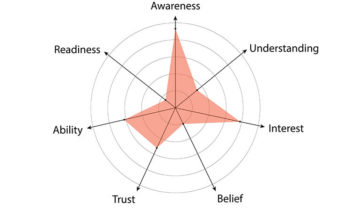Underwriting the Conversation
It reminded me that professional services are sold from the front of the room.
Sell from the Front of the Room
Speaking before audiences is great because it gives you a chance to demonstrate your expertise and not just tout it. Providing insight into blockchain technology is stronger than saying you are expert at such things. Better to show your acumen and let others conclude you are an expert than to make the claim yourself.
The effectiveness of this tactic is why, increasingly, conferences are monetizing the dais by charging professional service providers for the chance to speak to their audience – the so-called “pay to play” charge.
The Power of the Peer Panel
But what if you don’t have the budget or prominence to keynote? How do you harness this kind of “front of the room” power to drive your outreach and engagement?
Paul Quigley, a project manager at PIE and a veteran of the live event circuit tells us how. He recommends the peer panel. He likes to invite between three and five leading executives to headline an event focused on best practices. Generally, Paul “levels up” for the panel. In other words, if he is focused on an audience of CFOs of $50 million companies, the panelists are CFOs of $500 million companies.
Paul interviews each of the panelists beforehand on the topic to get a sense of where the gold lies and then moderates a conversation among the group before opening up to questions from the audience. When he sends out invitations, the invited “stars” help drive participation, which gives the event luster. Importantly, Paul (or his client) is well-positioned as the host of the conversation. There is a halo effect for the facilitator of the conversation. The moderator benefits because:
- They demonstrate their expertise by asking great questions.
- Their brand becomes associated with the success and status of their panelists.
- They communicate they care about the issues.
- They position themselves not as an expert with a point of view they are trying to hawk but as a “bee”, cross-pollinating best practices.
Become a Partner in the Conversation
Follow Paul’s lead, and the next time you write a prospect requesting time, they will warmly make time for you. Wouldn’t you want to sit down with an expert who is smart, connected, who cares deeply about the problems you face and who carry with them the latest in best practices? Hosted panel discussions position you as not just another subject matter expert but as a partner who cares enough the problems facing companies to underwrite the conversation that is inventing the future.




